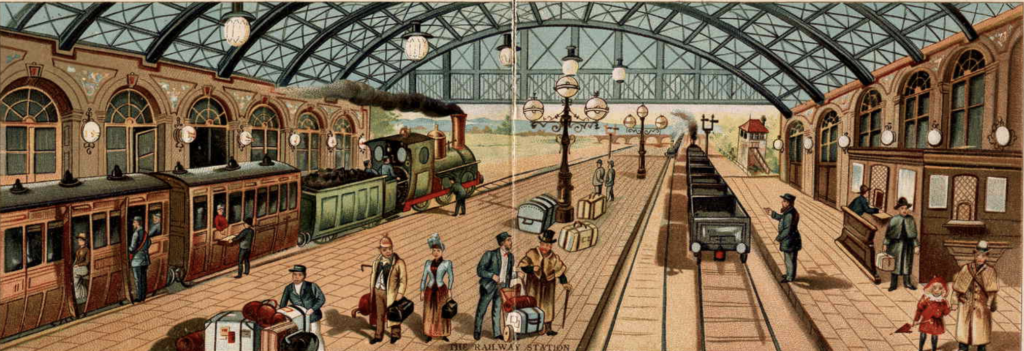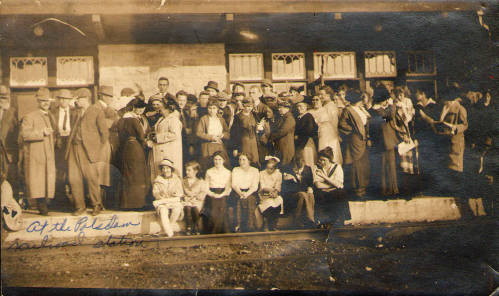THE RHYME OF THE DÉPÔT
By J.S.
Annotations by Kristina bowers

I. Vanity of vanities, Climax of vexation, Waiting for the cars At a rail-road station: Thinking every moment That the train will go, Worrying out an hour In a small dépôt![1] II. Sultry summer day, Hot Sahara weather, Motley crowd of people Huddled up together; Crowded in a room Filled with ‘loafers’ smoking, Wits and politicians Arguing and joking. III. Every class of people In this mighty nation, Fully represented In the rail-road station. Restless, whistling Yankee, With impatient tread, Wishes that the cars Would just ‘go ahead’! IV. Funny little Frenchman, With ejaculations, Shows his impatience In gesticulations. Rowdy at the glass, With a fierce moustache, Obviously thinks That he cuts a ‘dash.’ V. Corpulent old fellow, Looking very wise, With a lazy yawn Closes up his eyes; Waiting for the cars, It is no wise odd That he takes a train To the land of Nod! VI. Eager politician, Closing up his peepers, Runs off in a train Laid on heavy sleepers;
Paper in his hand So the stranger teaches, He was lulled to sleep By Kossuth’s[2] long speeches! VII. Philosophical stranger Says the cars are late, But we all must learn ‘To labor and to wait.’ Suddenly is heard An unearthly scream; ‘T is the engineer Letting off the steam! VIII. Universal rush For the narrow door, Half-a-dozen sprawling On the muddy floor: One would think the people, Crowding in so fast, Thought that every moment Was to be their last. IX. Every one impatient, Every body grumbling, Train at length comes in With tremendous rumbling: Like a band of furies[3] From the realms below, Wildly rush the inmates Of the small dépôt. X. Elbowed, jammed, and crowded, We may thank our stars If we find a seat In the rail-road cars: Chuckling with delight, With congratulation, That we have escaped From that rail-road station. XI. Worst of the little miseries That in life beset us, Greatest of the troubles That for ever fret us, Waiting one long hour For the cars to go, Elbowed, jammed, and crowded In a small dépôt!

S., J. “The rhyme of the DÉPÔT.” The knickerbocker; or new york monthly magazine 40, no. 4 (october 1852): 315.
[1] Dépôt: French for “A deposit or place of deposit.” The American English usage of “depot” to mean railroad station became popularized in 1842.
[2] Lajos Kossuth, a Hungarian revolutionary leader, came to America in December 1851 and embarked on a speaking tour, garnering the support of many Americans.
[3] Furies are goddesses of vengeance who reside in the Underworld in Greco-Roman mythology.
Contexts
By 1852, when this piece was published, the first phase of the American railroad expansion had been completed. Competition from canals, unorganized and haphazard layout, and decentralized oversight were all characteristics of railroad development from the early 1800s to about 1850. At the mid-point of the 19th century, steam engines had only been around for about 20 years but had succeeded in transforming the American rail system into the most popular and utilized mode of transportation in the country.
Resources for Further Study
- “Transportation in America Before 1876” from The National Museum of American History.
- “Early American Railroads” from Brittanica Encyclopedia.
- “The Beginnings of American Railroads and Mapping” from the Library of Congress Digital Collections.
- “Railroad Maps: 1828-1900” from the Library of Congress Digital Collections.
- “10 Ways the Transcontinental Railroad Changed America” from History.com.